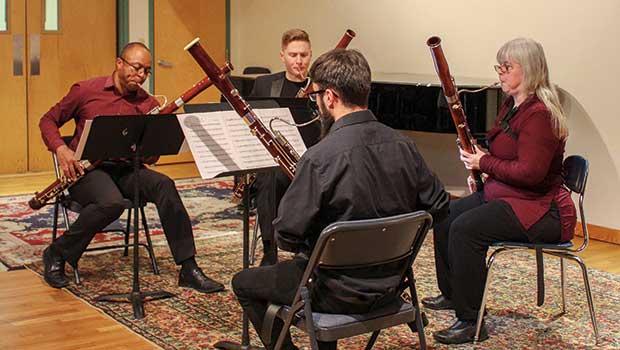
During “Bassoonery 34 x 3” at Community Music Center of Boston on Jan. 11, four performers breathed a marathon of notes into their bassoons. Their eyes were focused, faces moving expressively with each note. At a break between movements, CMCB Executive Director Lecolion Washington, who was one of the performers on stage, turned to the audience, beaming. “Wow, that’s good, isn’t it?” he said. “That’s fire.” These were bassoons like you’ve never seen them before.
The concert was a part of the John Kleshinski Concert Series, named for a former Music Center board president and student. These free monthly concerts showcase the diverse instruments and music types taught and celebrated at the Music Center. Case in point: 90 minutes of fire bassoon music.
“Bassoonery 34 x 3” honored the 34-year tenure of David Lapin, the executive director prior to the newly appointed Washington. The music featured works written in the last 34 years, some by composers under age 34.
“I tried to program things that were different, to give a sense of how flexible the bassoon is and how many sonic possibilities there are,” said Janet Underhill, bassoonist, music teacher and the organizer of the concert.
Included in the variety of music was “A Bell Ringing in an Empty Sky,” an adaptation by Underhill of a piece written for the shakuhachi, a Japanese bamboo flute. This piece showcased the lighter side of the bassoon’s range. “Earth for 2 Bassoonists,” composed by a 22-year-old percussionist now at Berklee, draws the succinct, low notes of a drum from the bassoon.
Underhill hopes the concert will cause the audience to consider bassoon music more seriously. “Bassoon traditionally has been called the clown of the orchestra,” she says. “But there are a lot of talented bassoonists here in Boston.” For those interested in exploring further, she recommends “Breaking Winds” a bassoon quartet that plays pop music, and “Bubonic Bassoon Quartet,” a group established in Boston that was one of the first to popularize bassoon music.
Community Music Center of Boston, a nonprofit, provides over $325,000 a year in scholarships to allow low-income students to study financially burdensome instruments, like the bassoon. Underhill notes that an entry-level bassoon can cost as much as $4,500, and that many professional bassoonists and musicians that came out of the Music Center could never have studied without financial aid.
Washington encourages community members to get involved with the center by attending the concert series, contributing financially or volunteering. “Artists have a responsibility to bring people together,” he says. “Be on the lookout, the Music Center is going to be involved in some big things in 2018.”







